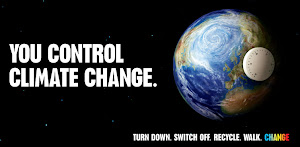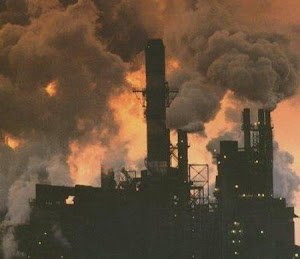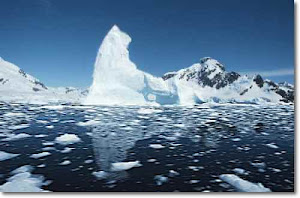A lot of information is out there on global warming, climate change, ozone depletion, and the greenhouse effect. What does it all mean and what should you know about our changing environment? This page will explain about three of the major topics being discussed today and how they are all different. We will look at global climate change, the greenhouse effect, and our ozone depletion. Lets begin our journey with global climate change.
Climate change is the when the average weather around a certain region changes from the region's past average temperature, precipitation, and so on. Global climate change is when the whole earth's average weather patterns change from past records. Climate change is different from global warming because global warming is the earth's average temperature increasing. Global climate change is the earth's whole weather patterns changing, not just the temperature. The earth has had many global climate changes in the past, such as the last ice age.
Our ozone mostly resides in the Stratosphere which is above the layer of the atmosphere we live in, the Troposphere. The particles that make up the ozone block much of the harmful solar radiation from getting into the lower layer of the Troposphere. Without the earth's ozone, solar radiation levels reaching earth's surface would greatly increase, creating deadly effects. Ozone depletion is the thinning out or complete disappearance of our ozone layer.
Ozone depletion is caused by harmful chemicals such as hydrocarbons and levo glucosin. When we drive our cars, fly over seas, operate large factories, and do other industrial activities, we release these harmful chemicals into the atmosphere. Many of these chemicals are harmless in their original state and would stay in the atmosphere for long periods of time with out causing any harm. When they reach the Stratosphere, however, they react with other gases that make up the ozone layer and mutate. These mutated particles can stay in the atmosphere for long periods of time destroying our ozone. The more chemicals we release into the atmosphere that harm our ozone, the thinner our ozone layer becomes until, like in some places, it disappears.
Our atmosphere is made up of a cloud of gases and suspended solids. Some of these gases and particles are known as greenhouse gases, such as water particles and carbon dioxide. The greenhouse effect is when the greenhouse gases trap in heat from the sun and heat the earth. Without the greenhouse effect, our earth's average temperature would be -18 Celsius. The greenhouse affect is also what makes Venus so hot. Venus has a much denser amount of greenhouse gases so more heat from the sun is trapped in its atmosphere helping to heat up Venus to 450 Celsius.
Our earth needs greenhouse gases to support life. If we didn't have greenhouse gases, all of the heat from the sun would leave the atmosphere and there would not be an equal balance of incoming energy verses outgoing energy. The greenhouse effect is a natural occurring event of balance. Humans however are releasing more greenhouse gases into the atmosphere making the greenhouse affect stronger than in the past. With more greenhouse gases, more heat is trapped in the earth's atmosphere helping to create global warming.
All of these events are interrelated but totally separate events. Ozone depletion is the thinning out or disappearance of our ozone layer. The greenhouse effect is when greenhouse gases trap heat in the earth's atmosphere. Global climate change is the change of the earth's average weather patterns. To learn more, visit my next page, "What Weather is Verses Climate", located under Links to My Other Pages.
Sunday, November 18, 2007
Wednesday, November 14, 2007
Links to My OTher Pages
Home, What Weather is Verses Climate, The Carbon Cycle, Global Climate Change is Real, The Evidence Behind Global Climate Change, How Hurricanes Work
Bibliography:
Clemmitt, Marcia. "Climate Change." CQ Researcher Beta 16 (2006). Nclive. Greensboro Public, Greensboro. 7 Dec. 2007. Keyword: Climate Change.
Atmospheric Chemistry and Physics: From Air Pollution to Climate Change. New York John Wiley & Sons, Inc, 1998. 7 Dec. 2007.
"Climate." EncyclopæDia Britannica Online. Nclive. Greensboro Public, Greensboro. 7 Dec. 2007. Keyword: Ozone Depletion.
Cooper, Mary H. "Ozone Depletion." CQ Researcher Beta (1992). Nclive. Greensboro Public, Greensboro. 7 Dec. 2007. Keyword: Ozone Depletion.
"Greenhouse Effect." EncyclopæDia Britannica Online. Nclive. Greensboro Public, Greensboro. 7 Dec. 2007. Keyword: Greenhouse Effect.
"METEOROLOGY AND CLIMATE: What's Happening to El NiñO??" Britannica Encyclopaiia Online. 1995. Nclive. Greensboro Public, Greensboro. 7 Dec. 2007. Keyword: Climate.
"Biosphere." EncyclopæDia Britannica Online. Nclive. Greensboro Public, Greensboro. 7 Dec. 2007. Keyword: Carbon Cycle.
Cyal, Carlson. "The Impact of Agrictulal Soil Erosion on Global Carbon Cycle." Science 318 (2007): 626-628.
Stix, Gary. "A Climate Repair Manual." Scientific American (2006): 46-49. Perkins, Sid. "What Goes Up." Science News 172 (2007): 152-154.
Perkins, Sid. "Runaway Heat." Science News 168 (2005): 312-317.
Reed, Christina. "Hot Trails." Scientic American (2006): 28.
Bibliography:
http://www.whrc.org/resources/online_publications/warming_earth/scientific_evidence.htm
http://www.ecobridge.org/content/g_evd.htm#graph
http://www.environmentaldefense.org/page.cfm?tagID=1011
"Turning Up the Heat." Consumer Reports 61 (1996): 38(6). Nclive. Greensboro Public, Greensboro. 13 Oct.-Nov. 2007. Keyword: Global Warming Evidence.
"Weather." Encyclopedia Britannica Online. Nclive. Greensboro Public, Greensboro. 7 Nov.-Dec. 2007. Keyword: About Weather.
"Carbon Cycle." EncyclopæDia Britannica Online. Nclive. Greensboro Public, Greensboro. 6 Dec.-Jan. 2007. Keyword: Carbon Cycle.
Clemmitt, Marcia. "Climate Change." CQ Researcher Beta 16 (2006). Nclive. Greensboro Public, Greensboro. 7 Dec. 2007. Keyword: Climate Change.
Atmospheric Chemistry and Physics: From Air Pollution to Climate Change. New York John Wiley & Sons, Inc, 1998. 7 Dec. 2007.
"Climate." EncyclopæDia Britannica Online. Nclive. Greensboro Public, Greensboro. 7 Dec. 2007. Keyword: Ozone Depletion.
Cooper, Mary H. "Ozone Depletion." CQ Researcher Beta (1992). Nclive. Greensboro Public, Greensboro. 7 Dec. 2007. Keyword: Ozone Depletion.
"Greenhouse Effect." EncyclopæDia Britannica Online. Nclive. Greensboro Public, Greensboro. 7 Dec. 2007. Keyword: Greenhouse Effect.
"METEOROLOGY AND CLIMATE: What's Happening to El NiñO??" Britannica Encyclopaiia Online. 1995. Nclive. Greensboro Public, Greensboro. 7 Dec. 2007. Keyword: Climate.
"Biosphere." EncyclopæDia Britannica Online. Nclive. Greensboro Public, Greensboro. 7 Dec. 2007. Keyword: Carbon Cycle.
Cyal, Carlson. "The Impact of Agrictulal Soil Erosion on Global Carbon Cycle." Science 318 (2007): 626-628.
Stix, Gary. "A Climate Repair Manual." Scientific American (2006): 46-49. Perkins, Sid. "What Goes Up." Science News 172 (2007): 152-154.
Perkins, Sid. "Runaway Heat." Science News 168 (2005): 312-317.
Reed, Christina. "Hot Trails." Scientic American (2006): 28.
Subscribe to:
Posts (Atom)


